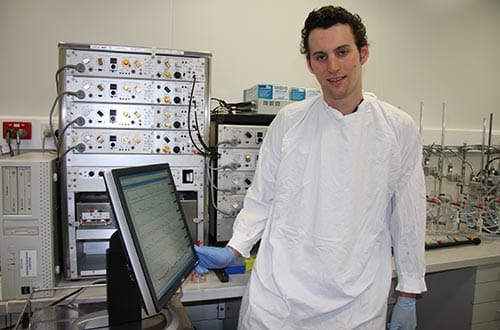
With premature and post-date pregnancies both posing potentially dire health risks for newborn babies and mothers, University of Newcastle researchers have been tracking a protein thought to act as a controller of contractions.

With premature and post-date pregnancies both posing potentially dire health risks for newborn babies and mothers, University of Newcastle researchers have been tracking a protein thought to act as a controller of contractions.
In a review just published on-line in the American Journal of Physiology, the team investigated the protein known as Myosin Phosphatase as an important target for new drug therapies to control labour.
“Pre-term babies can have all sorts of problems and post-date pregnancies have a high rate of still births, so both early and late deliveries are dangerous,” lead author Trent Butler*, a PhD student, said.
“We need to know more about the fundamental mechanisms involved in uterine function. Myosin Phosphatase is a mysterious protein because the tools needed to study it have only become available in recent times, and we’ve had to bridge the knowledge gaps to allow further discovery.
“We focussed on the smooth muscle called myometrium in the uterus. The myometrium contracts in a specific pattern, and the activity of this protein determines how effective contractions are; whether they are too strong or too weak.”
Senior-author Eng-Cheng Chan* said that the incident rates of pre-term pregnancies and inductions were increasing globally.
“When we interfere without fully understanding how labour occurs, we tend to overdo it, so women have to be rushed in for unplanned caesarean sections,” Dr Chan said. “For most of pregnancy the uterus is nice and calm, yet at term, within a very short window, the contractions begin.
“When it comes to therapies it’s really a case of right place and right time.”
The University of Newcastle team also collaborated with Professor Nick Europe-Finner from the Reproductive and Vascular Research Group at Newcastle University in England.
Trent Butler and Eng-Cheng Chan research in conjunction with HMRI’s Pregnancy and Reproduction Research Program and are members of the University of Newcastle’s Mothers and Babies Research Centre. HMRI is a partnership between Hunter New England Health, the University of Newcastle and the community.
HMRI would like to acknowledge the Traditional Custodians of the land on which we work and live, the Awabakal and Worimi peoples, and pay our respects to Elders past and present. We recognise and respect their cultural heritage and beliefs and their continued connection to their land.

Hunter Medical Research Institute
We’re taking healthy further.
Locked Bag 1000
New Lambton
NSW, Australia, 2305



This site is protected by reCAPTCHA and the Google Privacy Policy and Terms of Service apply.
Copyright © 2024 Hunter Medical Research Institute | ABN: 27 081 436 919
Site by Marlin Communications
